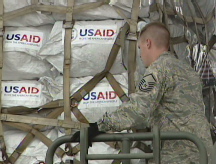U.S. loosens Myanmar aid restrictions
Treasury Department to allow individuals to send money to relatives and foreign charities in the wake of Cyclone Nargis.
NEW YORK (CNNMoney.com) -- In an effort to expedite aid to Myanmar, hard hit by Cyclone Nargis, the Treasury Department announced Monday that it is removing the limit on funds that Americans are allowed to send to individuals.
The Southeast Asian country, popularly known as Burma, was severely rattled by the May 3 cyclone. Myanmar officials said the storm killed an estimated 32,000 people - although outside agencies say the toll may be closer to 100,000 - and left about 1.5 million more in need of aid.
"The people of Burma need all the help we can provide during this crisis," said Adam Szubin, director of the Treasury's Office of Foreign Assets, in a statement. "This action will speed the flow of aid to the Burmese people."
The Treasury previously only allowed Americans to send Burmese relatives and friends a total of $300 per quarter as part of U.S. sanctions against the nation of Myanmar, which is currently ruled by an objectionable military government.
Although U.S. sanctions still exist on individuals giving to the government of Myanmar and some Burmese companies, the Treasury said that it will no longer impose sanctions on giving to non-government Burmese residents.
"We've been looking at making this change for quite some time, but certainly the disaster expedited the decision," said Treasury Department spokesman John Rankin.
While the easing of the restrictions for individual giving to relatives could help the situation, Rankin noted that the onus now falls upon individuals to ensure that the money gets into the right hands in Myanmar.
"We just hope people are wise about who they give their money to," he said.
If you'd like to give, but you are worried that your donation will not make it into the country, you could consider giving to an organization that is already on the scene.
"People are better off donating to charities that are well established and have been working in the country for years," said Lurma Rackley, a spokeswoman for aid group CARE. "While we are waiting for foreign aid to be allowed in, we are able to buy the necessary supplies locally."
International aid agency officials say Burmese cyclone victims could benefit most from foreign money if they have access to supplies, but the donations could have little effect for the majority of those in need.
"Assuming that the money reaches its destination, it might have an impact on the victims living in urban Yangon, as they have access to supplies and markets," said David Blanc, U.S. program director for Action Against Hunger. "But most of the victims are poor peasants living in the small villages of the Ayeyarwaddy Delta, so they won't have access to remittances let alone access to supplies of marketed goods."
The Treasury Department also removed limitations on giving to not-for-profit humanitarian efforts. The U.S. government had restricted Americans from giving funds to humanitarian or religious efforts in Myanmar that were not U.S. or non-governmental organizations, but now U.S. citizens can donate to any foreign relief effort with the exception of the Burmese government itself.
"We want to remove all the barriers and clear a path to aid," Rankin said. "Now Burma needs to do its part."
Though the government permitted a U.S. military plane to land with relief supplies Monday, many relief agencies are still reporting that the government is not allowing foreign aid to assist the storm's victims. The United Nations fears that hundreds of thousands more people could die from diseases related to the storm if the Burmese government does not allow in the necessary aid. ![]()


